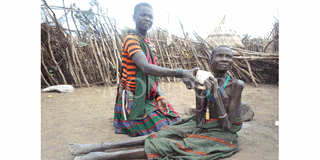Lack of irrigation funds threatens food security

A woman helps an old woman drink water in Atedeoi Village, Lotisan Sub-county, Moroto District. PHOTOS/SIMON PETER EMWAMU
What you need to know:
- The Karamoja Sub-region was the most food insecure at 41 percent by July as per the Cabinet’s statistics.
An ambitious government-backed food security plan is on the brink of collapse due to lack of funds for irrigation. The project is likely to sink with the billions of shillings already invested, according to personnel involved.
Worse, the government will unlikely achieve its plan to boost agricultural production across the country in order to guarantee food and animal feed security.
The plan, which kicked off immediately after both Cabinet and President Museveni gave it a nod, involves giving grants to government institutions with large tracts of land such as the prisons to produce select commodities while private large-scale farmers receive interest-free loans.
Saturday Monitor understands that there has been a marked lack of investment in the component, threatening billions of shillings the government has already sunk into the initiative.
The absence of irrigation portends a losing battle for the project as drought ravages many parts where the project is being implemented.
READ: Famine consumes Karamoja
President Museveni in a July 14 letter cleared a proposal by Agriculture minister Frank Tumwebaze on the “strategic intervention to boost large-scale food production.”
The plan involves mobilising support from the existing government entities involved in food production and big farmers in major parts of the country to increase their capacities to produce in large quantities.
An August 2 Cabinet memo approved the plan to focus on 224,650 acres, including maize (114,219 acres), soybeans (59,900) acres, beans (22,810 acres), and sorghum (2,720 acres).
The Cabinet agreed to support the proposed interventions of partnering with large-scale commercial farms/farming entities for mass production of strategic commodities to guarantee food and animal feed security.
At Kasolwe Stock Ranch in Kamuli District, this newspaper understands that more than 2,000 acres—already planted with different crops using public resources—will go to waste due to prolonged drought minus irrigation systems envisaged by the project.
The participating institutions and farmers with acres to be planted include Uganda Prisons (50,000 acres), UPDF (10,000 acres), the National Enterprise Corporation (5,280 acres), veterans (4,707 acres), National Agricultural Research Organisation (10,000 acres), National Animal Genetic Resources Centre and Data Bank (30,000 acres), and large scale farmers (314,000 acres).
The Karamoja Sub-region was the most food insecure at 41 percent by July as per the Cabinet’s statistics. More than 900 people are reported to have died in a recent drought spell in the north-eastern pastoralist sub-region.
The hunger is attributed to massive crop failures as a result of a long dry spell.




